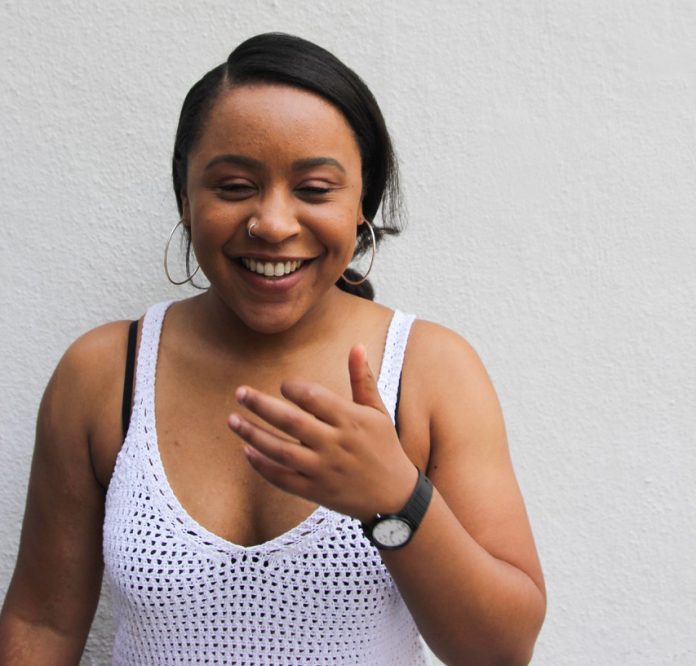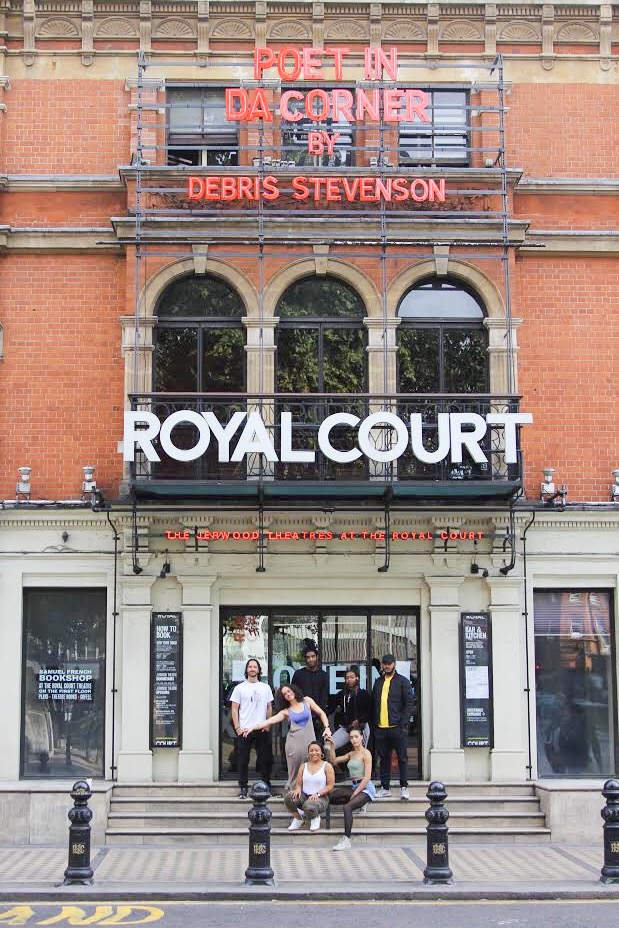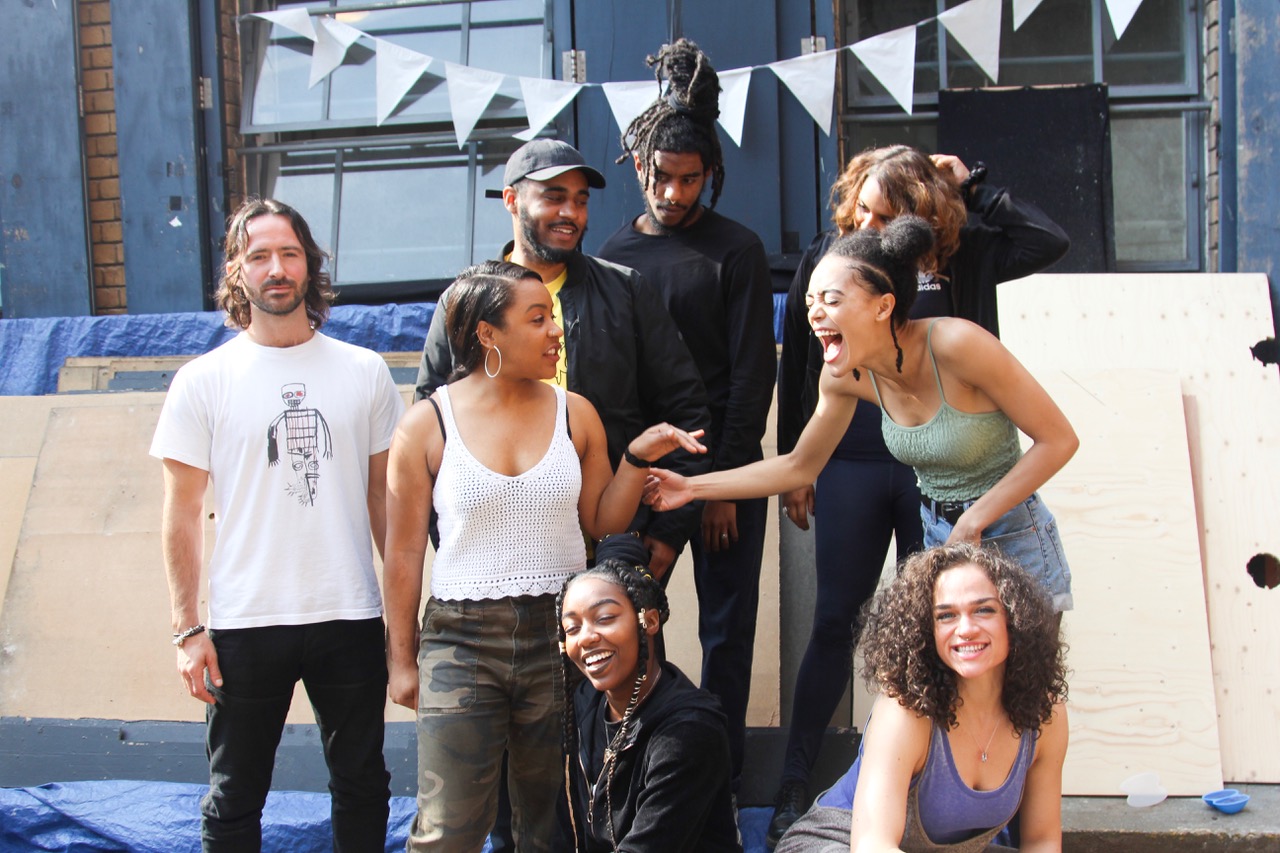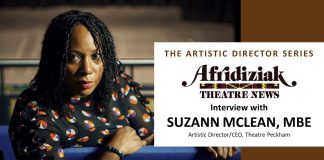Afridiziak Theatre News got a chance to chat to Ola Ince the director of the exciting new show Poet in da Corner, created by poet and playwright Debris Stevenson.
How are preparations going for the show?
We are having lots and lots of fun because everyone involved is beautiful, energetic and lots of fun to work with. It’s awesome as it is so rare that I get the chance to make work which reflects a period of time that I’ve lived through and can directly relate to, and about music that I listened to growing up. To have this sense of nostalgia is pretty awesome, and it’s even more exciting as I’ve never worked with grime artists or MCs before and the creative team on this project are really hot. To work with Debris, Mikey J, Jammz and all the crew has been amazing.
How did you first hear about Poet in da Corner and what made you want to get involved?
The Royal Court and I have had an ongoing relationship this year as I became one of their associate artists and I was due to run a project, when this came up almost out of the blue they asked me if I would be interested in working on it and I immediately jumped at the chance. We postponed other projects as they thought I was the perfect fit and I thought I was too and luckily Debris agreed too.
I love a challenge and so does Debris, I think we are both ambitious. Luckily, we chime well together and have a great dialogue which involves a lot of WhatsApp messages at all hours.
How has it been working with Debris?
We are similar and at the same time different. We’re similar in the way we think about work and the politics which is brilliant and we’re similar in the way we like to structure our days and work through things, so we’ve had an interesting working relationship as I’m both her director and her dramaturg. Before rehearsals had begun we started to work together intensely for two months and through that time I’ve worked on about 10 drafts of the show with her allowing her to develop from a dramatic performance perspective. For Debris there’s extra pressure for her as she’s both playwright and performer, so to help keep boundaries between both roles I’ve made a rule with Debris that when she’s in the rehearsal room she is the actor and outside of it she is then the playwright. Fortunately, I’ve had some experience when I worked on Josephine and I, with Cush Jumbo [read interview] as it was also semi-autobiographical, and Cush wrote and performed it.
What has directing this show been like for you?
When I first saw the initial draft of the show I felt it was amazing what she was trying to say with it politically and I encouraged her to push if further. I’ve also been working with Mikey and Jammz closely and the group trust and respect me (and vice versa), they have all allowed me access to all their secret places and been a big part of taking the show where it is now. It’s like a little family now and the dynamics of our relationship has been interesting as the show has evolved. I love a challenge and so does Debris, I think we are both ambitious. Luckily, we chime well together and have a great dialogue which involves a lot of WhatsApp messages at all hours. It’s the perfect balance for me as I think if I wasn’t involved dramaturgically I wouldn’t be able to serve the play as well as I think I have done as I understand every aspect structurally, politically and what is required onstage. This has been a good learning experience for her and for all of us.
Grime is the main focus and inspiration for Poet in da Corner, what music has influenced you and your creativity?
I love lyrics, I listen to music to hear what people are saying so for me hip-hop and grime are perfect examples of lyricism and form a huge part of my identity. I grew up listening to Nas and musicians like Jill Scott, who is also a poet. Their music really means something to me and has influenced me. Also Grime artists like Dizzee and DWE they are true creative artists who are able to use poetry to make impactful messages and that is what is important to me. I enjoy music but I don’t want to just dance to anything I want the music to be saying something important to me and everyone who hears it. Have a message.
Did you ever want to get on stage or in front of the camera?
I’ve always known I wanted to be director, back in school in Year 9 I was set a task and I knew then that I was more interested in creating the story then actively telling it.
Who or what inspires you as a director?
A lot of different things and people, I take influence from many different art forms. I like the work of directors Ang Lee and Quentin Tarantino. I also enjoy cartoons which is strange but has informed the way I work creatively and visually. In terms of theatre practitioners I have been inspired by the late Bertolt Brecht. As a director Phyllida Lloyd has been a massive inspiration to me, she’s taught me a lot on how to create a collaborative rehearsal room and creating connection. Dominic Cooke has also been inspirational as he’s taught me a lot about structure, presentation and dramaturgy.
As people of colour we live with things constantly being taken from us, and our art being criminalised, demonised and misunderstood. We want audiences to see that Grime music is an art form that should be honoured and praised and not condemned.
What has been your most challenging project so far? And your most enjoyable?
To be honest this year has been the most challenging year ever for me and its not been about a particular project but more about the number of projects that I am managing at once. (In 2015 Ola became a BBC Performing Arts Fellow and Resident Associate Director at the Lyric Theatre, Hammersmith. She is currently Artistic Associate at the Lyric, Hammersmith and Theatre Royal Stratford East to name but a few of her achievements) It has been a massive exercise for me in learning to stay prepared and organised as well and manage my time and also to remember to look after myself. Self-care is so important. It was great to get the Hospital Club award this year (Ola won the Theatre & Performance Award). To get that kind of recognition makes up for the lack of sleep. Working on Twilight: Los Angeles 1992 was incredible, working with Nina was awesome. I call her Nina Powers. I still can’t believe she worked so effortlessly to play all of those characters.
What’s your favourite form of self-care?
Yoga in my front room, it helps to centre and focus me, and reminds me that whatever I’m working on is just a play. Plays are important but we need to remember that we make art for the world and it’s important to remember where the balance is.
How have you overcome perceived barriers as a woman of colour in this industry?
By finding the opportunities that allow me to do what I love. Just do it. Luckily when I was young I didn’t know what was scary and I allowed myself to be fearless, which gets harder as you get older. My parents have always been massively supportive, not just of me as an artist but of me as a person. They’ve always instilled in me that I can be whoever I want to be and do anything I want to do. They showed me what it means to be black, in a positive way by telling me black is beautiful and as child reading books like Amazing Grace (a 1997 picture book by Mary Hoffman, about a girl who refuses to listen when told she is the wrong colour and gender to be Peter Pan in her school play), encouraging me. So now as an adult when I’m in a room full of people and I perceive that they don’t believe in me or are judging me because of my race or gender I already know who I am, I don’t need their affirmation. My parents are awesome.
What do you want the audience to take from the show?
Poet in da Corner is one of the vehicles showing that this artform deserves its space and the more I’ve learnt about Grime I’ve seen what an important political and cultural vehicle it is and what a sanctuary it is for so many people. Grime was a space where people could say exactly what was on their minds in their own voice and get things off their chest. It has touched so many people and connected us all. As people of colour we live with things constantly being taken from us, and our art being criminalised, demonised and misunderstood. We want audiences to see that Grime music is an artform that should be honoured and praised and not condemned.




























